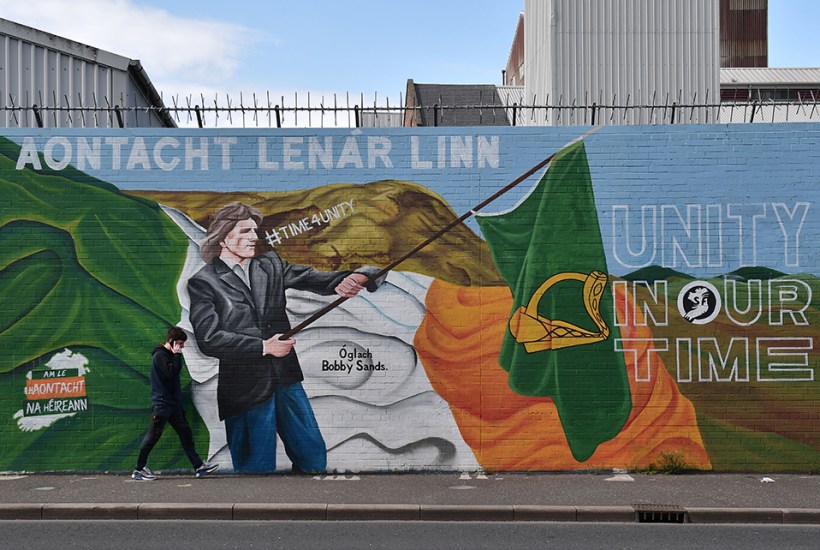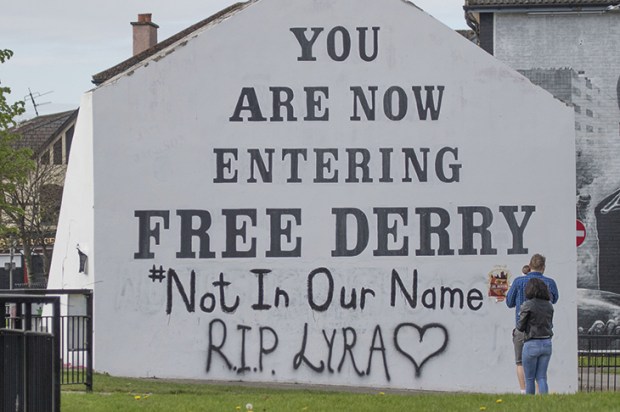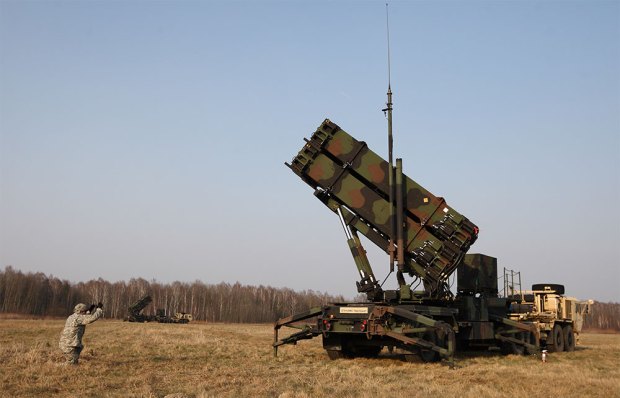A hundred years since the founding of the Irish state – on 6 December 1922 – how likely or desirable is the prospect of Irish unity? The recent electoral success of Sinn Fein suggested to many – particularly in the US – that the idea’s momentum is now unstoppable. Of course it’s being egged on by Sinn Fein itself, whose New York Times advertisements in March proclaimed that Irish unity would be in the best interests of ‘citizens abroad and the wider diaspora’. Extensive polling for the Irish Times this week, however, paints a much more complex, contradictory picture of opinion at home. Before stocking up on celebratory green beer, the Irish-American diaspora might well be advised to read it.
Among those polled in the Republic of Ireland, two-thirds said they would vote for a united Ireland in a border referendum. Yet this number declined when respondents were asked to consider a new Irish flag or national anthem to accommodate unionist citizens: almost half then declared themselves less likely to vote for a united Ireland in the first place. The idea that unionists could veto a new law if they thought it ‘violated their vital interests’ triggered the same effect. The Irish Times characterised the South’s desire for unity as ‘wide, but not deep’. Sinn Fein’s current status as Ireland’s most popular party may owe more to its stance on housing and healthcare than the border.
In Northern Ireland, half of all respondents said they would vote against a united Ireland, with only 27 per cent in favour. The majority opposed were Protestant, at 79 per cent. But a surprisingly large minority of Catholics also refused to back unity, with 21 per cent against and 21 per cent undecided. One reason is the NHS: across the sectarian divide, people fret about losing access to free universal healthcare, even though Northern Ireland’s hospitals are currently in crisis. Charges for healthcare in the Republic, where a visit to the GP can cost €60, send shudders down Northern spines. Ireland’s argument that many patients are exempt from fees, and have better health outcomes overall, does little to reassure them.
Beneath the wrangling on policies, however, sits a more serious concern: that the pursuit of Irish unity against the wishes of a significant Protestant minority could trigger violence. While 73 per cent of all Northern Ireland voters would accept a vote in favour of unity – happily or unhappily – 18 per cent said they would find it ‘almost impossible to accept’. Among Protestants, such resistant respondents constituted 32 per cent: some would, no doubt, leave Northern Ireland altogether; others would stay while adapting with discomfort to the new state; and a third group – such as still-active loyalist paramilitaries in the Ulster Volunteer Force and Ulster Defence Association – might well be willing to reignite violence in opposition to unity.
The grimmest prospect – clearly an anxiety for Southern poll respondents – would be a slim referendum victory for Irish unity, followed by a loyalist paramilitary campaign in Ireland. In this scenario – a nightmarish mirror image of the IRA’s campaign in Britain – Irish and not British troops would be required to act as Northern peacekeepers. In an Irish Times vox pop from a Roscommon pub, one regular asked of the North: ‘When they throw the rattle out of the pram, would we have to send troops up there to keep them quiet?’ A Southern participant in a focus group was cited saying of loyalism: ‘They still have paramilitary capabilities and then we would have to deal with that, the same way as they did for over 30 years from London. They would be regarding themselves as second-class citizens.’
It’s an appalling scenario, but one which must nonetheless be weighed. The moral argument against any such loyalist violence would be, rightly, that a small number of paramilitaries should never be able to override the wishes of a democratic majority. But this vital principle has been steadily undermined in recent years by the electoral ascent of Sinn Fein. The current Northern Ireland First Minister, Michelle O’Neill, argued in August that ‘at the time there was no alternative’ to the Provisional IRA’s squalid 30-year campaign, despite the fact that John Hume’s moderate SDLP offered a very clear nationalist alternative, and the vast majority of Irish people then publicly opposed IRA violence.
Yet when polled recently, nearly seven out of ten Northern nationalists agreed with O’Neill’s analysis, and – as it’s the official Sinn Fein position – presumably many Southern Sinn Fein voters do too. As a template, it’s a dangerous one, raising the question: if a minority of loyalists felt sufficiently aggrieved and marginalised inside a united Ireland, or en route to one, might loyalist paramilitaries claim similar justification for a renewed armed campaign?
The late comedian Dave Allen used to tell a joke about how when Irish people were asked for directions, they’d answer: ‘I wouldn’t start from here.’ It’s a gag about illogic but the answer makes sense to me: it means that from this particular point, working out the journey is especially difficult.
Nationalism and unionism should have been sitting easier together, more than 20 years since the ceasefires and the Belfast Agreement, breaking down sectarian stereotypes and uniting against the common scourge of paramilitarism. Instead, the self-romanticising of murderous sectarian factions has been indulged, and their murky operations tolerated with a light official touch.
Now we have an isolated unionism, rendered insecure by the post-Brexit Protocol and its sea border; a buoyant Sinn Fein, defending past IRA violence; and an Irish electorate which seemingly enjoys the idea of Irish unity, but not that of rendering the state more palatable to unionists – oh, and also armed, twitchy loyalist paramilitaries, flush with drugs money.
The degree of ambivalence and fluidity in the polls on unity suggests that quite a lot of people in Ireland, including many nationalists, may think as I do. When it comes to fast-tracking the reality of a united Ireland, I wouldn’t start from here.
The post Don’t expect a united Ireland any time soon appeared first on The Spectator.
Got something to add? Join the discussion and comment below.
Get 10 issues for just $10
Subscribe to The Spectator Australia today for the next 10 magazine issues, plus full online access, for just $10.
You might disagree with half of it, but you’ll enjoy reading all of it. Try your first month for free, then just $2 a week for the remainder of your first year.















Comments
Don't miss out
Join the conversation with other Spectator Australia readers. Subscribe to leave a comment.
SUBSCRIBEAlready a subscriber? Log in